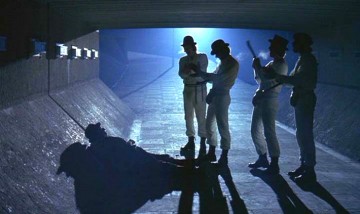
A new report claims that British children are being 'raised online' spending at least 20 hours a week connected to the internet. In August 2007 Microsoft proudly put the figure at more like 34 hours. The IPPR report states that 57% of young people have come into contact with online porn. 117 videos featuring the term 'happy slap' were posted on YouTube last week, and 312 were posted as 'street fights'. Microsoft claim that internet use increases social interaction – but is this the kind they mean?
Just what does the availability on the internet of instant gratification of every kind do for tolerance? In the real world, gratification isn't instant. Things don't go to plan and people don't always behave predictably. How are today's kids learning to react?
Also this week, one third of teachers are reported as having been subjected to classroom violence, with 75% threatened by their pupils. Another report shows four times as many teachers finding knives on their pupils than in 2001, in spite of the increasing use of metal detectors in schools. Across the country, the quality of teaching is suffering as teachers struggle to cope with multilingual classes. In more than one in 20 schools, English is a minority language:
In the borough of Newham, nine out of 10 schools have a non-English first language majority. The same is true of a third of schools in Leicester and in Blackburn, and a quarter of schools in Birmingham.
Outside school, people are not mixing like they used to. Every community used to have a pub, church and post office at its centre. They were the hub of local life - places where we met new people and learned to get along. Now 2,500 more post offices are to close and in Langton Green in Kent:
Gone are three of the village's four pubs; gone are the two police houses; gone is the horticultural society; gone is one of the two grocery stores, one of the two butchers, the last dairy farm, the YMCA playing field, the doctor's surgery – all in recent memory – and now, gone is the post office. Gone too is the wildlife from the village pond, seen off by a new drainage system which draws in the oil and detritus from the road.
Publicans say that tradition and the fabric of society is being destroyed by the loss of four pubs per day across the country. Around one church per week is closed.
Another 2008 survey reports that 15% of people don't speak to any of their neighbours from one week to the next. And 65% said that in the future people will have more contact through the internet than in person:
"There's a real issue with people being dislocated from the communities where they live," said Ginny Lunn, the director of policy and development at the Prince's Trust. "Everybody needs to take responsibility for communities and make sure people aren't isolated, otherwise we could face a generation of people who will become unconnected from society."
Pundits say cash will solve the problem. The Government says things are improving. And L'Oreal says you're 'worth it'. At the grassroots, plenty of us are still trying, giving our time, building places like community orchards so that people can connect again. Margaret Thatcher's most memorable line was 'there's no such thing as society'. Don't let it come true.